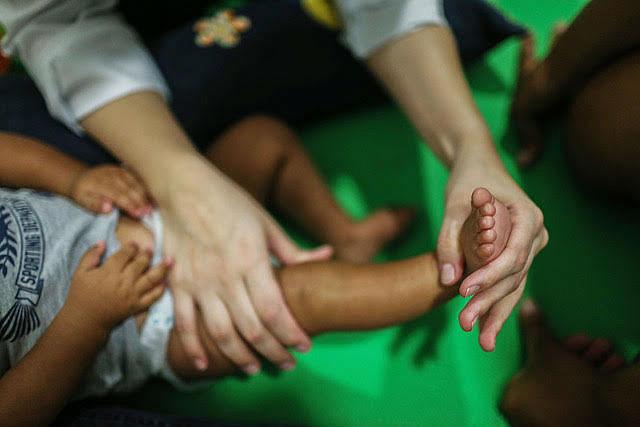If pediatricians screen moms for depression, why not occupational therapists?

I first met Kyle and his mother two months after Kyle had been discharged from the NICU. He was born prematurely, and at 8 months old he was showing developmental and feeding delays. As a pediatric occupational therapist, I was there to help Kyle make progress on these basic skills.
Throughout my work with Kyle, I could sense that his mother was overprotective of him. At each appointment, his mother shared that she frequently brought her son to the emergency room or the pediatrician because his lungs had been underdeveloped, and she was always afraid that he was not breathing properly. With therapy, Kyle progressed, but the gains did not ease his mother’s worries.
In my work as an occupational therapist, I often encounter worried parents. Kyle’s mother, however, was very different. Whenever I asked her how she was doing, she would say, “Having a child wasn’t what I expected!” She was completely overwhelmed, hypervigilant, constantly anxious about Kyle’s health, and detached.
Over time, I realized that Kyle’s mother might have postpartum depression (PPD), a condition that affects one in five women. Symptoms include anxiety, feelings of hopelessness and inadequacy as a parent, an inability to connect with one’s baby, obsessive thoughts about a child’s safety, and withdrawal from family and friends. Sometimes mothers with PPD are too overwhelmed to comply with therapy treatments and, like Kyle’s mother, express feelings of despair. Mothers with infants admitted to the NICU have a 40 percent higher chance of developing PPD compared to the general population. The feeling of distress from caring for an infant from the NICU is an early warning sign that can alert doctors and therapists that a mom needs more support to prevent depression.
My experience with Kyle’s mother suggests there’s an important role pediatric occupational therapists could be playing to identify depression in moms. Currently, most pediatric OTs do not screen mothers for depression and other postpartum disorders — but perhaps we should. The research suggests that signs of PPD and postnatal anxiety often go undetected. To identify these issues earlier, I now screen mothers who bring their infants to my practice by asking moms how they have been adjusting to the arrival of their baby. If I notice that a mother manifests signs of PPD or anxiety, then I also use the Edinburgh Postnatal Depression Scale to gauge the severity of her symptoms. If necessary, I then educate her on postpartum depression, provide resources and make referrals.
I am also piloting a mommy-and-me program for mothers with depressive symptoms and their babies (up to 1 years old) who have been discharged from the NICU. Mothers who enroll in this pilot program participate in mommy-and-me groups that meet in a pediatric hospital once per week for six weeks. During the meetings, mothers work with trained facilitators to enhance their own and their children’s well-being, and receive support from other mothers who are in the same situation. The program is still in its early stages, but we’re gathering data along the way to measure its potential benefits for mothers.
Mothers’ mental health is crucial to their babies’ health and development. If occupational therapists and other providers could become educated on maternal mental health and screen mothers for PPD and postnatal anxiety during their children’s appointments, then occupational therapists can provide women with the help and referrals they need to promote their well-being and ensure their children ultimately thrive.
Pediatricians may already screen moms, but occupational therapists see these families more frequently. Many of my colleagues are saying it’s about time for our profession to play such a role, even if we don’t always know where to start. Even though we receive mental health training in OT school, maternal mental health was not included in the curriculum — but it should be. Some occupational therapists, such as myself, have pursued continuing education in maternal mental health to help fill this gap.
A collaborative approach is essential in maternal mental health. It takes a village to help babies and families thrive. For occupational therapists to work as part of a larger team, we need to be able to screen, refer and support mothers in need.
(Photo: Mario Tama/Getty Images)

